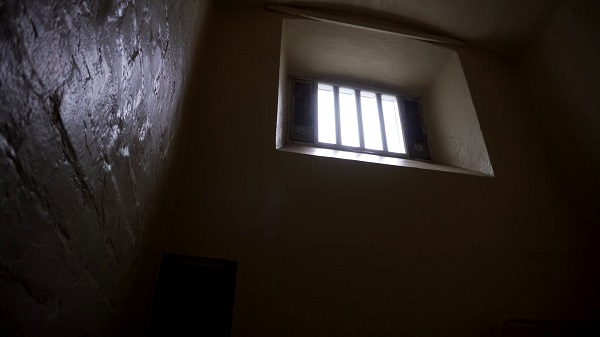FWP:
The story is that Jacob went blind with weeping for the lost Joseph; his eyes turned completely white. Joseph ended up in Egypt, in a dark prison cell, but Jacob's white gaze, wandering everywhere, sought him out even there. No gaze can see for miles, into a foreign country; no gaze can see through thick walls. Yet Jacob's blind gaze somehow can, and does. No gaze can see into a dark cell, yet Jacob's 'white' gaze somehow can and does. Yet does the gaze really 'see'? It 'wanders' all over the cell-- is that 'seeing', or a sign of a deeper mystical insight, or simply a kind of blind restless longing? This is a haunting verse about the love of a parent for a lost child. Compare the haunting {111,4}, in which Jacob's eyes become crevice-work in the wall of the cell.
In the first line, we learn that even in prison Joseph didn't abandon his 'chamber-adorning' [;xaanah-aaraa))ii]. This phrase has two possible meanings: first, that he himself was chamber-adorning, meaning that he was so beautiful as to be himself an adornment to any room; or second, that he did chamber-adorning, meaning that he redecorated a room to enhance its beauty.
Both of these possibilities are evoked, and fulfilled, in
the second line. Joseph is so irresistibly beautiful that even alone in the
darkness he adorns his chamber, and the blind white gaze of Jacob never ceases
to wander after him, lovingly and admiringly. And even more enjoyably, Joseph is also fastidious:
he beautifies even his prison cell, so that for his sake the whitewash of Jacob's gaze
constantly spreads itself [phirnaa] on the walls of
his dingy chamber.

Nazm:
That is, when in separation Jacob's eyes indeed keep turning white, then it's as if he's come into Joseph's cell. The reason is that his eyes, searching and searching, arrived in the cell, and the whiteness of his eyes is spreading whitewash on the walls of the cell. And the spreading of whitewash on the cell, and the eyes' becoming white, share a common condition of movement, and here too the basis for similitude is movement. (60)
== Nazm page 60